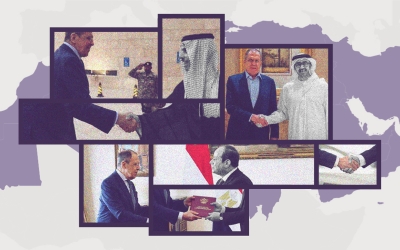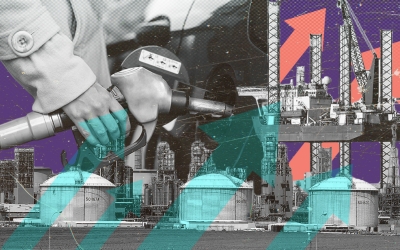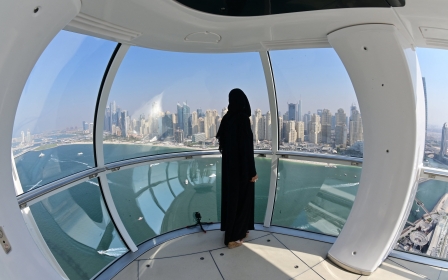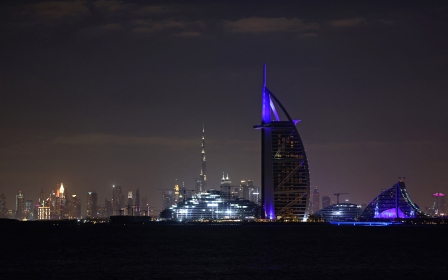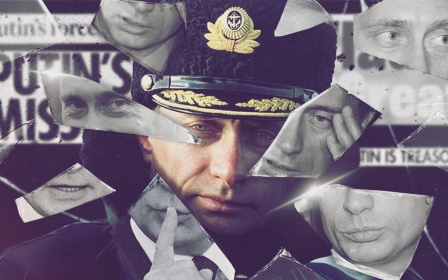Sanctions on Russian bank raise questions about ‘sanctions-proofing’ in Gulf
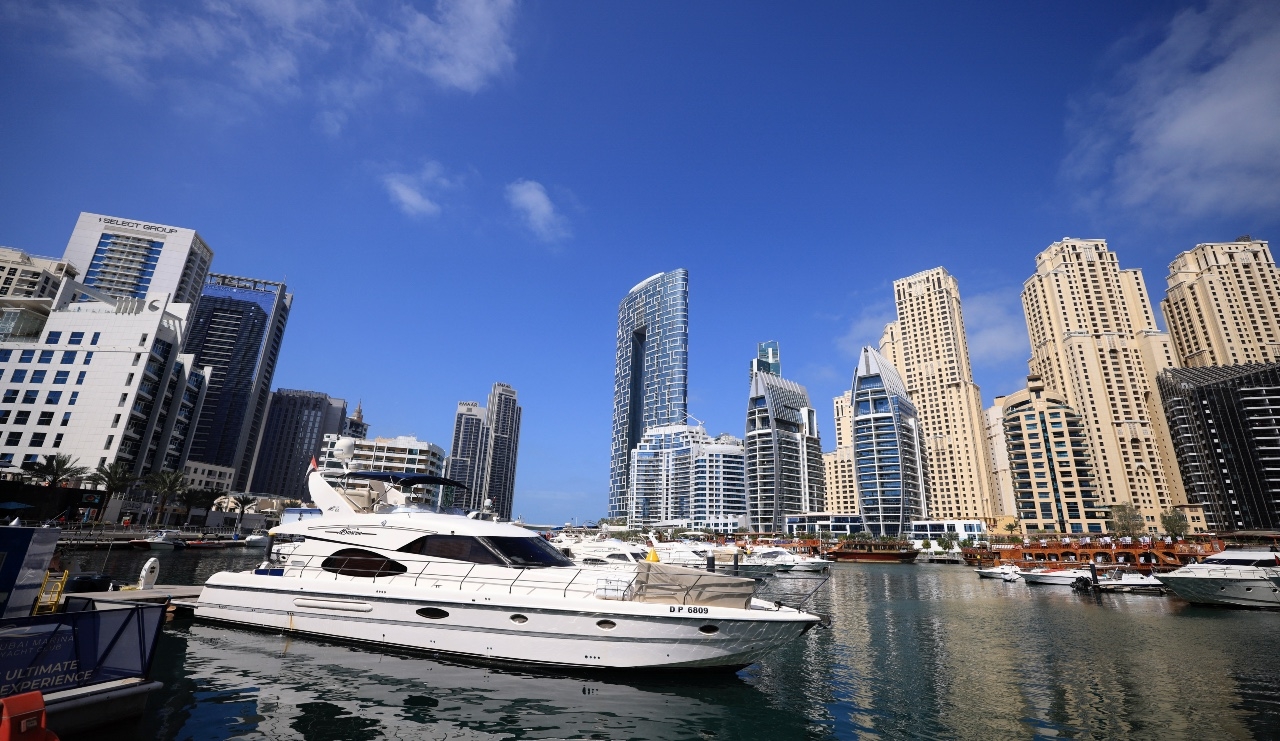
A Russian bank operating in the UAE was sanctioned by the US on Friday, amid concerns that Moscow’s growing economic ties to the Middle East are helping it evade western sanctions, as the war in Ukraine enters its second year.
MTS Bank, which has branches in Moscow and Abu Dhabi, was included in a new list of sanctions rolled out by the US Treasury against more than 200 individuals and entities across Europe, Asia, and the Middle East, which are accused of aiding Russia’s war effort.
“As Russia searches for ways to evade sanctions and export controls, the US government is ramping up efforts to counter such evasion around the world,” the Treasury Department said in a statement.
'The bank (MTS) contributed to supporting legitimate trade'
- UAE Central Bank
Business between the UAE and Russia has boomed amid the war in Ukraine.
Non-oil trade between the two grew by 57 percent in the first nine months of 2022, breaking all records. In December, Emirati Trade Minister Thani bin Ahmed al-Zeyoudi pledged to “push trade to even greater heights".
New MEE newsletter: Jerusalem Dispatch
Sign up to get the latest insights and analysis on Israel-Palestine, alongside Turkey Unpacked and other MEE newsletters
Wealthy Russians flocked to Dubai after the 24 February 2022 invasion of Ukraine, and Russians were the top buyers of real estate in Dubai last year.
The decision to grant MTS a licence to operate was viewed as a sign of Russia's growing economic clout in the UAE. At the time the licence was issued, MTS was not under US sanctions.
'Ahead of the curve'
Rachel Ziemba, a sanctions expert at the Center for a New American Security, told Middle East Eye the bank was “ahead of the curve" in establishing itself in the UAE, to take advantage of the influx of Russian emigres and new business opportunities.
“The bank (MTS) contributed to supporting legitimate trade between the two countries and servicing the Russian community in the UAE, under the supervision of the Central Bank,” according to a statement issued by the Emirati Central Bank on Friday.
The UAE Central Bank said it “supervised” transactions MTS conducted that exceeded certain thresholds “in view of the circumstances that the country of the bank's headquarters is going through”, an apparent reference to Russia’s invasion of Ukraine.
MTS is a financial unit of Russia's largest mobile operator Mobile TeleSystems. Ziemba says the bank likely avoided sanctions until now because of its small size and limited financial role in important commodities.
The US indicated that could be changing: "sanctioned actors have been known to turn to smaller banks as well as wealth-management firms in an attempt to evade sanctions as Russia seeks new ways to access the international financial system,” the Treasury Department statement said.
'Emirati financial institutions may decide to sever their banking relationships with MTS Bank'
- Alex Zerden, former Treasury Department official
Ziemba says that given the sweeping scale of sanctions announced on Friday, the US wasn’t targeting the UAE specifically, but looking to close all the Kremlin's potential financial channels. The UK also sanctioned four banks on Friday, including MTS.
Western officials have, however, been paying greater attention to the regions where countries have refused to sign on to western sanctions. The White House dispatched a treasury official to both Turkey and the UAE in February this year to pressure them to cut commercial ties with Russia.
Last year, Turkish President Recep Tayyip Erdogan said Turkey was looking at possible alternatives to the Russian payment system Mir, following US sanctions. Trade between Turkey and Russia has surged about 200 percent as the war in Ukraine rages.
'Chilling effect'
In the UAE, the sanctions on MTS are likely to have a chilling effect, Alex Zerden, a former Treasury Department official in the Obama and Trump administrations, told MEE.
“Emirati financial institutions may decide to sever their banking relationships with MTS Bank based on OFAC’s (Office of Foreign Assets Control) designation,” he told MEE.
“Most of these Emirati banks that would be doing business with MTS are doing business with the US-based financial system. They won’t want to put that at risk,” Ziemba added.
US sanctions carry heft because the US dollar dominates global trade. The Swift financial messaging system that facilitates money transfers also relies on banks in the US.
Middle Eastern states could accelerate their push to look for trade alternatives with Russia as a long-term result of the sanctions on the UAE-linked bank, Ziemba said.
Cinzia Bianco, a visiting fellow at the European Council on Foreign Relations, told MEE in an earlier story that the Ukraine war is already being seen by Gulf states like the UAE as "a testing ground" for the bigger showdown expected to come between China and the US.
"The war has given the Gulf states a chance to think about sanctions-proofing their systems," she added.
The MTS sanctions could slow the UAE's burgeoning energy trade with Russia as well, Ziemba said.
Middle Eastern states have been doing a brisk energy trade with Russia as a result of western sanctions. EU states banned Russian crude and G-7 countries instituted a $60 per barrel price cap last year. They followed up with the same measures on petroleum products in February.
The Middle East capitalised, buying up cheap Russian fuel, either using it at home to free up more domestic energy for export or relabelling the Russian product. The transactions have had the tacit approval of Washington, which wants to keep Russian energy on the market while denting the Kremlin’s war chest.
The Emirati port of Fujairah is bursting with product as a result of Russian imports. Kpler, a firm that tracks petroleum shipping, expects the UAE to import 3.0 million barrels of Russian fuel oil in February and 4.34 million in March, up from 750,000 barrels in February last year.
The UAE central Bank said it is “studying now the available options regarding the new status of the bank and appropriate decision will be taken in due course”.
Middle East Eye delivers independent and unrivalled coverage and analysis of the Middle East, North Africa and beyond. To learn more about republishing this content and the associated fees, please fill out this form. More about MEE can be found here.


